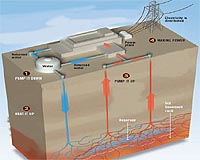 |
Funafuti, Tuvalu (UPI) Jul 21, 2009 Tuvalu, the tiny Pacific island nation halfway between Australia and Hawaii, is set to become the first carbon-neutral country in the world. The rising tide caused by global warming seemed like it would eventually submerge low-lying Tuvalu's nine coral islands, five of which are atolls. There was even talk of moving its 12,000-plus inhabitants to Australia. But soaring fuel prices prompted the world's fourth-smallest country to turn to renewable energy alternatives. Now Tuvalu aims to become the first nation to generate all its energy from renewable sources by 2020. Tuvalu teamed with e8, a non-profit consortium of 10 energy firms from the Group of Eight nations organized after the 1992 Rio Earth summit, as well as with the Japanese government. For the first phase of Tuvalu's renewable energy projects, a 40-kilowatt solar energy system was installed on the roof of the country's largest soccer stadium in Funafuti, the capital. Inaugurated in February 2008, the stadium solar project features a grid-connected solar system that meets about 5 percent of Funafuti's peak demand and 3 percent of annual household consumption. The project will contribute to powering Tuvalu's households, healthcare facilities, small and medium enterprises and other local development infrastructure. Data from e8 indicates that after its first 14 months of operation, the solar stadium reduced consumption of generator fuel shipped from New Zealand by 17,000 tons and saved 50 tons of carbon dioxide from being released in the atmosphere. In addition, the system reduces the risk of diesel fuel spills around Tuvalu's pristine reefs. Most of Tuvalu's residents make a living from fishing and farming. There is no heavy industry. "The plight of Tuvalu versus the rising tide vividly represents the worst early consequence of climate change. For Tuvalu, after 3,000 years of history, the success of U.N. climate talks in Copenhagen this December may well be a matter of national survival," Takao Shiraishi, general manager of Japan's Kansai Electric Power Co., one of the funders of the stadium project, said in a statement. Tuvalu's Public Utilities Minister Kausea Natano said his nation wanted to set an example to others. "We look forward to the day when our nation offers an example to all -- powered entirely by natural resources such as the sun and the wind," Natano said. Tuvalu gets sunlight most of the year. The Tuvalu government estimates it will cost about $20 million to reach its goal of 100 percent clean energy by 2020. Other nations that have vowed to become carbon neutral include Norway, New Zealand, Iceland and Costa Rica. Share This Article With Planet Earth
Related Links
 Geothermal Energy Most Efficient Renewable Energy Alternative
Geothermal Energy Most Efficient Renewable Energy AlternativeNew York NY (SPX) Jul 21, 2009 As the Obama Administration pushed the energy bill through the House, government organizations and corporations are assessing renewable energy alternatives. Which are the most efficient and improving the fastest? According to a new study from NYU Stern, geothermal and wind energy are more efficient, and are yielding greater returns on the R and D invested in them, than most other renewable ... read more |
|
| The content herein, unless otherwise known to be public domain, are Copyright 1995-2009 - SpaceDaily. AFP and UPI Wire Stories are copyright Agence France-Presse and United Press International. ESA Portal Reports are copyright European Space Agency. All NASA sourced material is public domain. Additional copyrights may apply in whole or part to other bona fide parties. Advertising does not imply endorsement,agreement or approval of any opinions, statements or information provided by SpaceDaily on any Web page published or hosted by SpaceDaily. Privacy Statement |